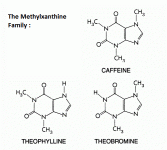"Methylxanthines? I'm using those?"
The simple answer is, unless you're living an entirely stimulant-free lifestyle, almost certainly yes.
In the bad old days of yore, when certain supplement makers wanted to put a bit more kick into their pre-workout product, they would add ephedrine in fairly large amounts, or, in later years, "geranium oil" (1,3-dmaa --> never actually found in geranium oil, but was used as a loophole)
With the advent of the regulation of these products by various precursor control regulations, the manufacturers fell back onto some old standbys...the methylxanthines.
"There's that word again - what are methylxanthines?"
True, you probably haven't heard them called that - but that's what they are. Ever heard of something called Caffeine?
"OH! Of course!"
Well, Caffeine is the commonly recognized methylxanthine. Its two partner compounds, theophyline and theobromine are less commonly known, but equally important, and here's why.
First off, let me point out that any natural source of methylxanthines inevitably has all *3* compounds - just in varying proportions.
Caffeine is the primary methylxanthine in *Coffee* (Coffea/caffea - botanical name)
Theophyline is the primary methylxanthine in *tea* (Theaceae - family name for plant)
Theobromine is the primary methylxantine in *chocolate* (Theobroma - botanical name)
Enough of the history....why are these important?

Well, because they can help with training!!!!
Why would people use ephedrine?
a) It's a stimulant, you get the energy boost
b) It's a bronchiodialtor, you get improved respiration capability (especially if you have any asthmatic tendencies, or seasonal hay-fever issues)
c) It's an appetite suppressant - so, if cutting, increased metabolism, *and* reduced appetite helps keep weight loss ticking over.
Why should you use methylxanthines?
a) They are stimulants, you get the energy boost (seem familiar?)
b) They are bronchiodialators (to a lesser extent, but still noticable) - again, sound familiar
c) They are appetite suppressants (you saw that one coming, didn't you?)
***HOWEVER***
Here is where things get interesting.....
Just as some people get heart palpitations even on low doses of ephedrine, there are people who have issues with caffeine, for example.
What is also frequently true is that they *don't* necessarily have issues with the other members of the family.
So, given that some manufacturers build their pre-workouts around caffeine, and some around theophyline (theobromine is rare, but I'm betting *someone* is doing it) you can still get the benefits of the compounds while working around any sensitivity issues that might be had with one specific member of the group.
There are even some manufacturers of "natural" supplementation that sell tablets of theophyline (or theobromine) in the same way as caffeine tablets - another option for people sensitive to one of the family.
So, now you know, and knowing is half the battle (OK....who remembers this....)
So, don't just turn your nose up at caffeine and it's cousins - you might find that as training aids go, they can be quite surprising.
Doctor9 (B.Sc. Chemistry - yes, it can be useful, sometimes)
The simple answer is, unless you're living an entirely stimulant-free lifestyle, almost certainly yes.
In the bad old days of yore, when certain supplement makers wanted to put a bit more kick into their pre-workout product, they would add ephedrine in fairly large amounts, or, in later years, "geranium oil" (1,3-dmaa --> never actually found in geranium oil, but was used as a loophole)
With the advent of the regulation of these products by various precursor control regulations, the manufacturers fell back onto some old standbys...the methylxanthines.
"There's that word again - what are methylxanthines?"
True, you probably haven't heard them called that - but that's what they are. Ever heard of something called Caffeine?
"OH! Of course!"
Well, Caffeine is the commonly recognized methylxanthine. Its two partner compounds, theophyline and theobromine are less commonly known, but equally important, and here's why.
First off, let me point out that any natural source of methylxanthines inevitably has all *3* compounds - just in varying proportions.
Caffeine is the primary methylxanthine in *Coffee* (Coffea/caffea - botanical name)
Theophyline is the primary methylxanthine in *tea* (Theaceae - family name for plant)
Theobromine is the primary methylxantine in *chocolate* (Theobroma - botanical name)
Enough of the history....why are these important?
Well, because they can help with training!!!!
Why would people use ephedrine?
a) It's a stimulant, you get the energy boost
b) It's a bronchiodialtor, you get improved respiration capability (especially if you have any asthmatic tendencies, or seasonal hay-fever issues)
c) It's an appetite suppressant - so, if cutting, increased metabolism, *and* reduced appetite helps keep weight loss ticking over.
Why should you use methylxanthines?
a) They are stimulants, you get the energy boost (seem familiar?)
b) They are bronchiodialators (to a lesser extent, but still noticable) - again, sound familiar
c) They are appetite suppressants (you saw that one coming, didn't you?)
***HOWEVER***
Here is where things get interesting.....
Just as some people get heart palpitations even on low doses of ephedrine, there are people who have issues with caffeine, for example.
What is also frequently true is that they *don't* necessarily have issues with the other members of the family.
So, given that some manufacturers build their pre-workouts around caffeine, and some around theophyline (theobromine is rare, but I'm betting *someone* is doing it) you can still get the benefits of the compounds while working around any sensitivity issues that might be had with one specific member of the group.
There are even some manufacturers of "natural" supplementation that sell tablets of theophyline (or theobromine) in the same way as caffeine tablets - another option for people sensitive to one of the family.
So, now you know, and knowing is half the battle (OK....who remembers this....)
So, don't just turn your nose up at caffeine and it's cousins - you might find that as training aids go, they can be quite surprising.
Doctor9 (B.Sc. Chemistry - yes, it can be useful, sometimes)






